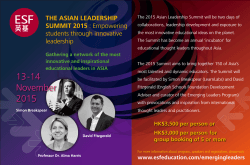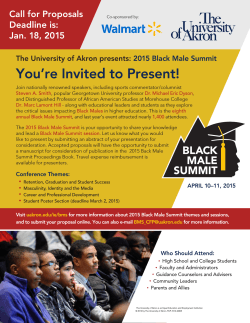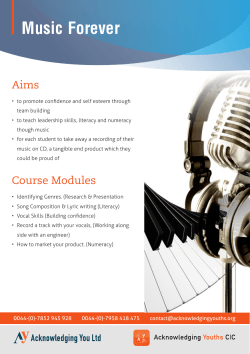
than Knowledge: Promoting Critical Thinking and Values
Creating an energy literacy supply chain: Closing the gap from emerging science to education Dr. Karla Bradley Eitel Justin Hougham Jennifer Schon Danica Hendrickson Tammi Laninga MOSS graduate students Steve Hollenhorst Liv Hasselbach Shelley Pressley Chad Gotch Greg Fizzell Northwest Advanced Renewables Alliance Two of the Education Team Goals: Strengthen overall science literacy of students in areas particular to biofuels 2015 Extension Energy Education Summit Improve energy and biofuels literacy of teachers educating our future citizens But what is energy literacy? 2015 Extension Energy Education Summit an energy literate citizen will understand “the nature and role of energy in the universe and in our lives” and will be able to “apply this understanding to answer questions and solve problems.” Energy Literacy Supply Chain 2015 Extension Energy Education Summit Energy Literacy Supply Chain 2015 Extension Energy Education Summit Feedstock Pre‐treatment Conversion • Primary research • Journal articles • Presentations • Newsletters • Curriculum • Workshops • Classroom and field‐based education • IT competition LCA: Energy Literacy Assessment Products and Co‐products • Energy literacy • Scientific literacy and Problem‐ solving skills • Workforce development Knowing More Is Not Enough… 2015 Extension Energy Education Summit The Grand Challenge: bridging a knowledge gap is not sufficient to make real change in public opinion and behavior regarding complex environmental issues (Varner, 2014) Knowing More Is Not Enough… 2015 Extension Energy Education Summit The Guiding Principle: The goal of science communication is not agreement, but fewer, better disagreements. If that communication affords [scientists and the public] a shared understanding of the facts, then they can focus on value issues (Fischoff, 2013). 2014 Annual Meeting Seattle, WA Knowing More Is Not Enough… Make decisions, solve problems Economic Environmental Critical thinking Shared understanding of the facts (Fischoff, 2013) Social Our approach to science communication 2015 Extension Energy Education Summit Our Approach: RESARCH: Directly connect teachers and students to NARA research INQUIRY: Provide opportunities for hands‐ on exploration CRITICAL THINKING: Promote critical thinking and discussion acknowledging multiple values frameworks Case example: MOSS Teacher Workshop 2015 Extension Energy Education Summit Environmental Economic Social Is this a good idea? How do we know? MOSS Teacher Workshop: Research > Hands On Exploration > Critical Thinking 2014 Annual Meeting Seattle, WA Research: Long and Boston (2014), Laninga, IDX team Hands on exploration: Compare methods for quantifying slash pile volume Hands on exploration: Compare methods for quantifying slash pile volume Critical Thinking: Which methods are best? How do better estimates impact the efficiency of the supply chain? MOSS Teacher Workshop: Research > Hands On Exploration > Critical Thinking 2015 Extension Energy Education Summit Research: Pre‐treatment and co‐ products teams Zhang, Houtman, and Zhu (2014) Ian Dallemeyer, Carter Fox Hands on exploration: separating “lignins” from “cellulose” Hands on exploration: enzymatic hydrolysis Critical Thinking: What are the challenges of separating lignin from cellulose? What are some potential economic and environmental tradeoffs of different approaches? MOSS Teacher Workshop: Research > Hands On Exploration > Critical Thinking 2015 Extension Energy Education Summit Research: LCA team Ganguly lab (2014) Hands on exploration: Life Cycle of a Cup of Coffee Hands on exploration: LCA of different fuels (FtF lesson) Critical Thinking: How does the LCA process help us to answer the question of “Is this a good idea”? What evidence do we have so far? 2015 Extension Energy Education Summit Is this a good idea? How do we know? Stakeholder Meeting Environmental, Economic and Social Lens Team Presentations 2014 Annual Meeting Seattle, WA Knowing More Is Not Enough… Make decisions, Solve problems Economic Environmental Critical thinking Shared understanding of the facts (Fischoff, 2013) Social Incorporating DOE’s Energy Literacy Principles with NARA Lessons 2015 Extension Energy Education Summit Incorporating DOE’s Energy Literacy Principles into an assessment Identify relevant ELPs Craft objectives Write test items Pilot test 2015 Extension Energy Education Summit Implement Use results to guide program improvement Assessment Results 2015 Extension Energy Education Summit 15 10 6.7 8.12 7.5 5 0 Energy Literacy Pre‐test Post‐test Delayed Post Middle schools students’ (n = 304) Energy Literacy scores before, after and one month after a MOSS program. Changes in mean scores are all statistically significant at p<.05. Next -- Capturing the “other” learning 2015 Extension Energy Education Summit Shared understandings Values exploration Critical thinking •What do I think about this? •What do I most value? What should we value? Problem solving •How can I participate? •How do we move forward? Energy Literacy (citizenship and workforce development) 2015 Extension Energy Education Summit Next Steps • Add ethics curriculum • Use assessment to guide new curriculum creation • Develop (modify) and test tools for assessing critical thinking, problem-solving and values exploration Your Ideas Thank you! 2015 Extension Energy Education Summit MOSS Teacher Workshop: Research > Hands On Exploration > Critical Thinking More feedstock for critical discussion: 2014 Annual Meeting Seattle, WA
© Copyright 2025









